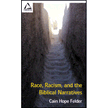
Race, Racism, and the Biblical Narratives by Cain Hope Felder on Sale for .99 at Christianbook.com
 |
Race, Racism, and the Biblical Narratives by Cain Hope Felder on Sale for .99 at Christianbook.com Read More
What The Blues Teaches Us About Preaching

 |
Race, Racism, and the Biblical Narratives by Cain Hope Felder on Sale for .99 at Christianbook.com Read More